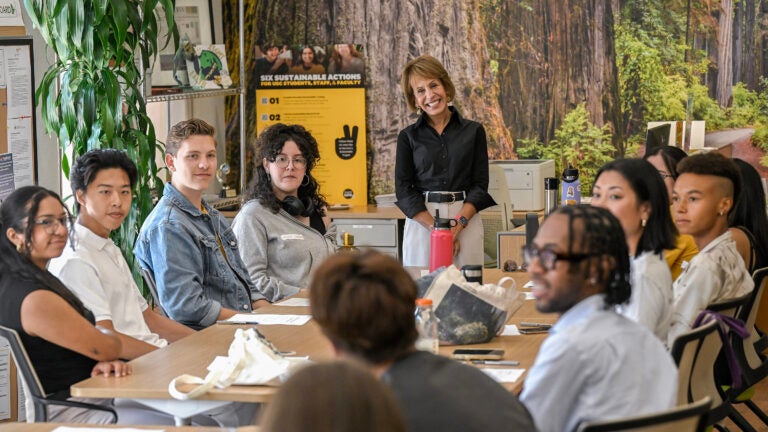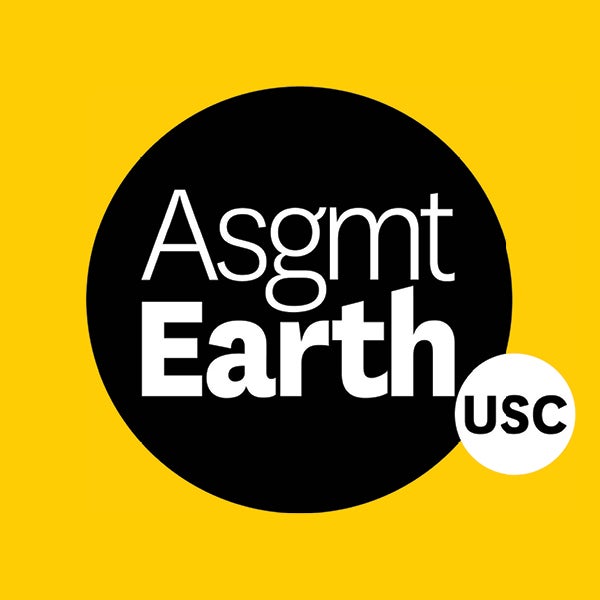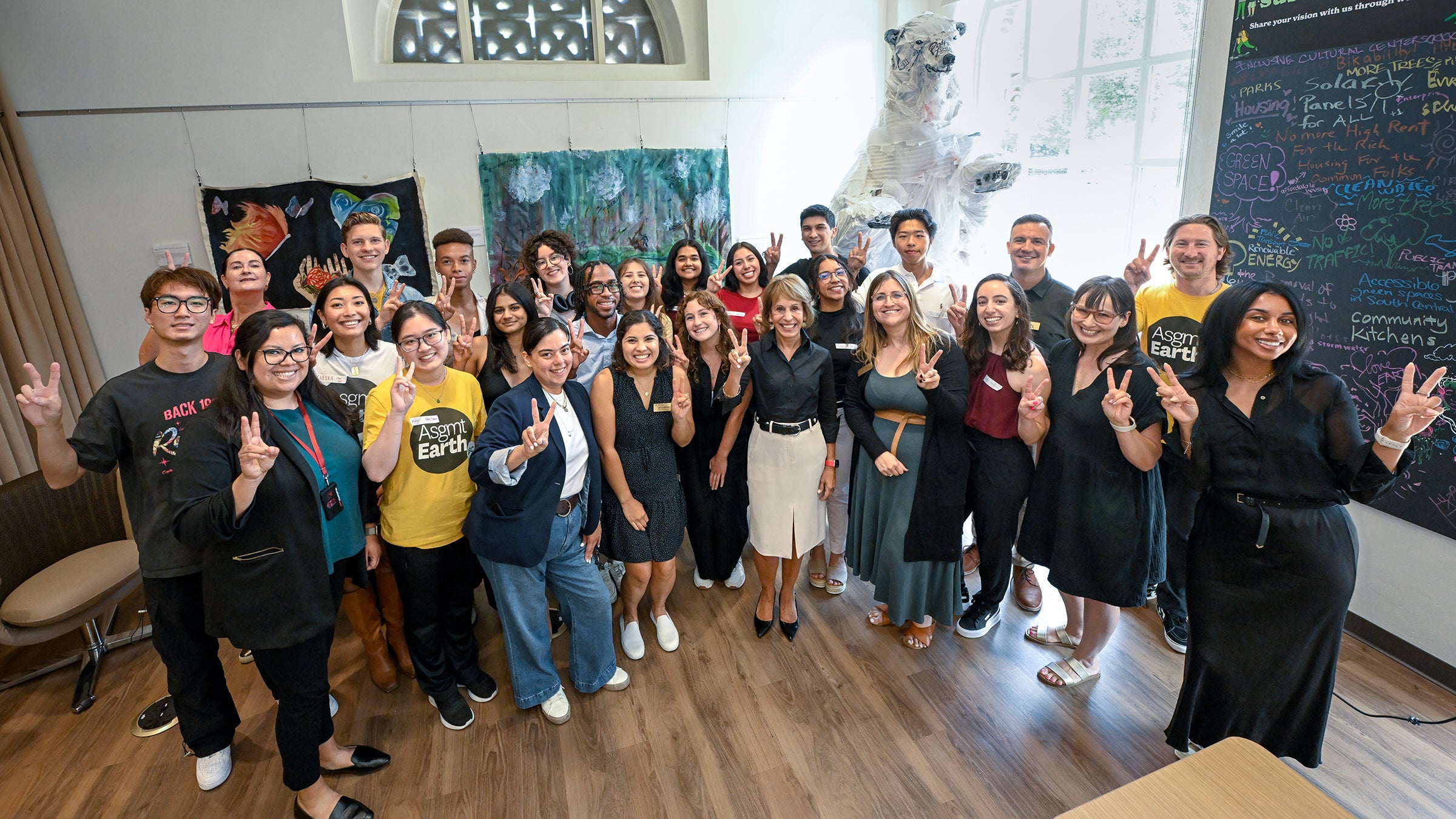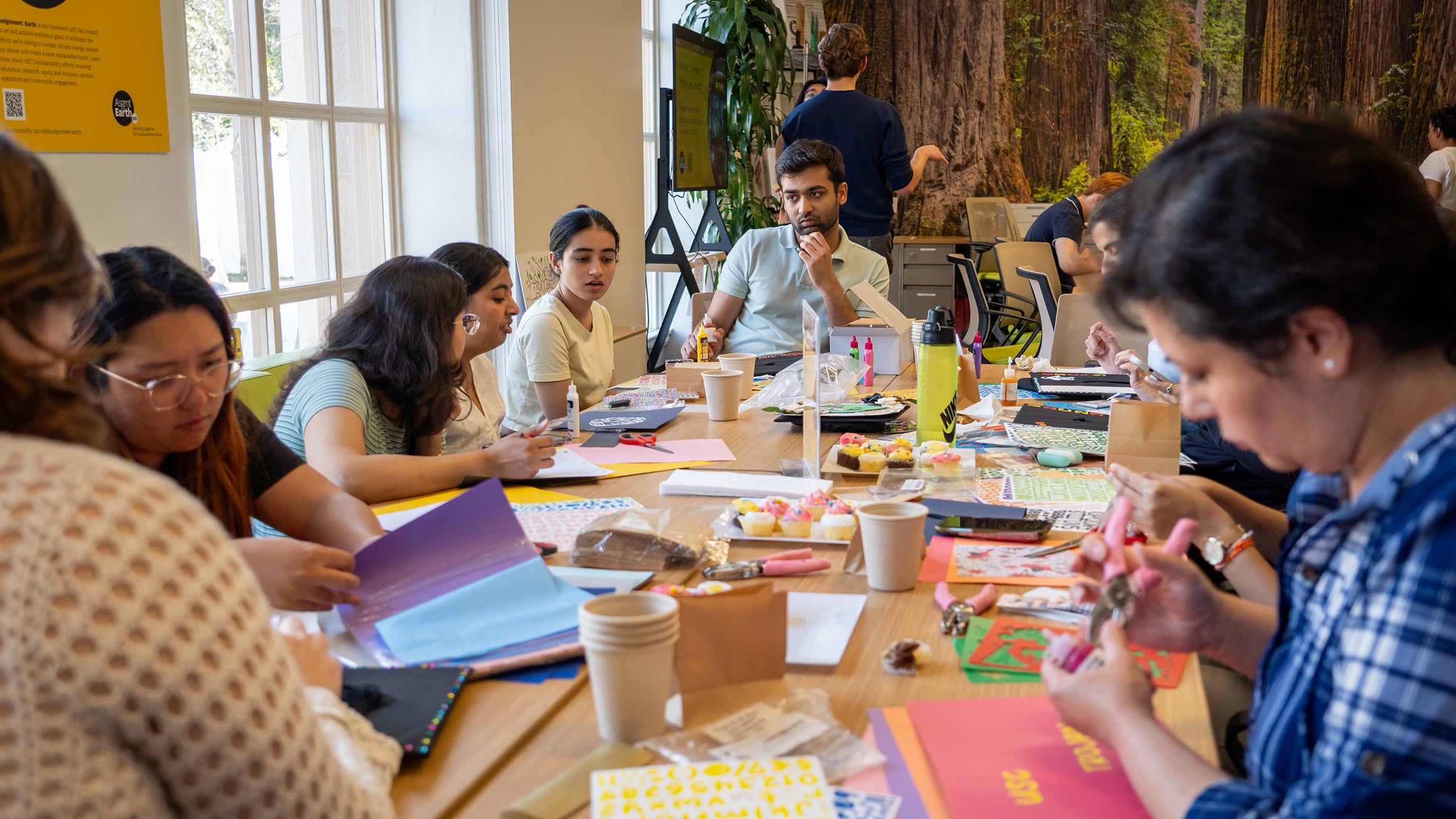
USC President Carol Folt greets Sustainability Hub interns and staff. (USC Photo/Gus Ruelas)
USC students make an impact in sustainability
GREEN WEEK: As USC celebrates its fourth annual Green Week, there are more ways than ever for students to get involved in sustainability. Read the story and watch the video.
Whether it is choosing from a record number of sustainability-focused courses or joining a student advocacy group, USC offers an unprecedented number of ways students can demonstrate their commitment to a greener, more sustainable future.

In the past four academic years the USC Sustainability Across the Curriculum Initiative, created and led by the President’s Working Group on Sustainability and Office of Academic Programs, has issued 46 grants to create new or update existing sustainability-related courses.
Among the array of newly launched options added to the USC Sustainability Course Finder for the fall semester are Sustainability and Self-Care, which offers alternative ways to integrate sustainability practices into a student’s daily routine as well as guidance on navigating climate anxiety and Climate Stories, which explores ways students can craft “action-oriented” narratives about climate crisis.
“USC has always had faculty that are passionate about sustainability and created courses for students that shared that passion,” said Jill Sohm, Sustainability Across the Curriculum Initiative academic director.
“In the past four years, with the support of the administration, we have seen an amazing increase in courses across the entire university because absolutely every discipline has an important role to play in achieving a sustainable world.
“I encourage all students to seek out and enroll in a course that explores sustainability topics because it will be a part of any job they have after college and sustainability is critical to all of our futures.”
Sustainability Hub anniversary
In the year since the Sustainability Hub opened in the Gwynn Wilson Student Union building on the USC University Park Campus, as a collaborative and inclusive multiuse gathering space for advancing sustainability, the venue has hosted 209 events and welcomed almost 8,000 visitors.

“The Sustainability Hub was designed with lots of great input from students, and purposely serves multiple functions,” said Mick Dalrymple, USC’s chief sustainability officer. “It’s a resource center where all Trojans can find out about sustainable behaviors and actions they can take, as well as news about upcoming events, jobs, internships and research opportunities.
“But it’s also an informal lounge to hang out, study, connect with friends and strengthen our vibrant sustainability community. In one year, the hub has become incredibly popular. There’s something for everyone, and everyone’s welcome.”
Environmental Student Assembly
Among the USC student groups that host regular meetings in the Sustainability Hub is the Environmental Student Assembly (ESA), which last April celebrated 10 years of promoting environmental awareness at the university.
The assembly’s current co-executive directors, Jon-Marc Burgess and Hope Hsiao, came from different backgrounds but found common purpose in the organization’s mission. Burgess first began to think about climate issues growing up in Kingston, Jamaica. Hsiao’s interest was sparked after spending time in Beijing as a middle school student and observing the city’s air pollution issues.
“Being part of the ESA has allowed me to develop my public speaking skills and taught me how to work in groups,” Burgess said. “Not only are you trying to benefit the environment, but you are also trying to better yourself as a person.”
“Being part of the ESA has shown me how to get things done,” Hsiao added. “I really learned from my peers that sustainability isn’t just a linear path. It is very important to surround yourself with a community of people that care.”
Student Sustainability Committee
Another way USC students can make an impact in sustainability is by applying to join the Student Sustainability Committee (SSC), which is the student committee of the Presidential Working Group on Sustainability in Education, Research, and Operations. The SSC organizes various initiatives under Assignment: Earth and also makes recommendations to university leadership on sustainability education, research and campus operations issues.
“Students should join the SSC if they want to work with a group that’s supported by the president and works together with the administration to make change,” said Skylar Funk, graduate co-chair of the committee. “It’s a chance to really see how much we can get done here at USC.”
Funk combines his time working on sustainability initiatives with his studies at the USC Thornton School of Music and his band Trapdoor Social, which has performed around the country with a self-contained solar power stage that fuels the sound and lights.
He works closely with Sara Eyassu, undergraduate co-chair of the Student Sustainability Committee, who left her home in Aurora, Colo., to pursue a degree in environmental studies at USC.
“The SSC is very much student-driven,” she said. “Anything that students want, they can pitch it, and if other students are interested, they can get involved.”
Funding opportunities
There are a variety of funding and scholarship opportunities available to USC students. They include the Undergraduate Sustainability Grand Challenge Fellowship program, sponsored by the USC Center for Sustainability Solutions, that supports multidisciplinary research focused on sustainability, and the Postdoctoral Fellowship for Sustainability Solutions, which seeks to advance sustainability research and inform future leaders in various areas.
The USC Wrigley Institute for Environment and Sustainability offers a variety of funded opportunities for students at different stages of their academic journey while the President’s Sustainability Internship Program was created to help build a community of students who could share knowledge across different project teams.
“It is a unique opportunity for students to combine their passion for sustainability with their academic training to help achieve our Assignment: Earth goals,” said Chelsea Graham, experiential learning manager. “Students work on a wide range of projects from analyzing and collecting data on USC operations, research and academics, to developing engagement strategies that reach every member of the USC community via social media and in person at the USC Peace Garden and Sustainability Hub.”

Applications are currently being accepted for the Arts & Climate Collective, which provides an opportunity for students to combine arts, media and culture to bring attention to environmental issues.
All USC students who are curious about sustainability are strongly encouraged to take the Sustainability Training course that provides an introduction to the many ways the university has embraced sustainability and how they can make a difference.
“From joining the Environmental Student Assembly or the Arts & Climate Collective, to conducting research for the Undergraduate Research Grand Challenge, to discovering fabulous classes through the Sustainability Course Finder, to sampling the many Earth Month campus events, students have so many opportunities to get involved with sustainability at USC,” Dalrymple said.
“Getting involved in sustainability is incredibly rewarding: It helps students connect, teaches them about sustainable actions they can take and — most importantly — brings them hope by showing them how their actions build a solutions-based, sustainable future that works for everyone.”
Trojan Sustainability Alumni Network
Recognizing many former USC students who have gone on to become leaders in sustainability, the Trojan Sustainability Alumni Network officially launches this month.
Its mission is to “amplify, educate and empower sustainability across the USC community and beyond.”
“Trojans are making an incredible impact in sustainability,” said Mark Spears, who co-founded the network and serves as its chair. “The network is a way for us to join forces, learn about the best-in-class work underway at our university, share ideas about ways we can work together and learn from each other to make a positive difference.”



